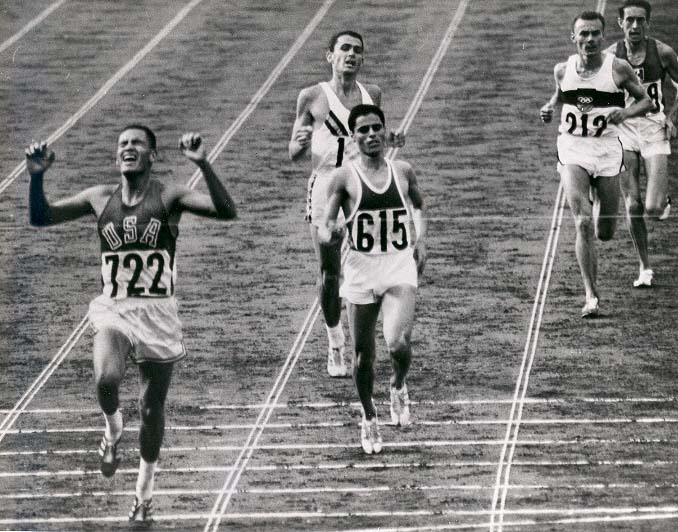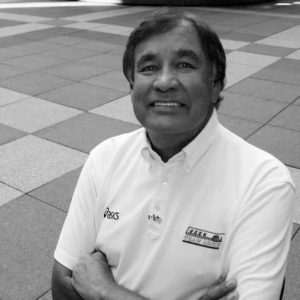Billy Mills
Olympians Are Chosen by the Gods
“The number one objective of my Olympic pursuit was to heal a broken soul.” Gold medalist Billy Mills set a world record in the 10,000-meter race at the 1964 Games. He shares how running created a refuge for spirituality and personal growth.

Image by U.S. Marine Corps, Public Domain Work.
Guest

Billy Mills grew up on the Pine Ridge Indian Reservation in South Dakota. He is the first and only American to win the men’s 10,000 meters race in the Olympics. He is the co-founder of Running Strong for American Indian Youth.
Transcript
BILLY MILLS: My name is Billy Mills. I was born on the Pine Ridge Indian Reservation in South Dakota, which is the second largest reservation in the nation. I live in Fair Oaks, California now.
My first memory of running was a Jesuit priest gave my father what I’ll call a book, but it was actually a collection of articles and one of the articles said, as my dad read them to me, “Olympians are chosen by the gods,” and I wanted to become an Olympian. I wanted to be chosen by the gods, and it had absolutely nothing to do with the Olympic Games. My mother had just died and I thought if I was chosen by the gods, even if they were the Olympic gods, perhaps I would be able to see my mother again.
At that point I had just turned nine. My mother died, she had passed about a year earlier. So my first memory of the Olympic Games or of running, I should say, evolved around what I’d call a very sacred element of maybe seeing my mother again.
My dream, at that point I thought I would try boxing. I had six fights in the ring, zero wins and six losses and that hurt. [laughs]
I tried basketball. I was slow. I got in for a game and lost it because I went to the wrong basket and scored two points. Football hurt. But I ran and then I felt spirituality. I could feel my feet pounding against the earth. I could breathe in and if the wind is blowing in the right direction, a quarter of a mile away you’d be some wild flowers and I could inhale the fragrance of the flowers and it felt spiritual.
The first official track meet I was in, the little Indian boys lined up. We go into this white community and all of the young white athletes had on track shoes, track uniforms. I had on basketball shoes, Levis, and a t-shirt. At the School of Mines in Rapid City, South Dakota, I got dead last in the 400 meters, but I enjoyed it. I enjoyed the movement, the activity.
So when my dad died and I was 12, I didn’t really pursue much running. Then I get to high school. I am 5’1”, 102 pounds, the second smallest young boy at the school, Haskell Indian School in Lawrence, Kansas. And the coach was talking to us and he simply said, “one of you can do something magical in sport. One of you could become a great athlete.” Just having the coach point at me saying, “One of you could do something magical,” I felt it was my dad speaking to me. My sophomore year, the third race I ran I won — was undefeated the rest of my high school career.
So I came out of high school with the fourth fastest mile in the nation, making good grades, ended up with a full athletic scholarship at the University of Kansas.
My practice as I got ready for the Olympic Games started when I was still in college and I came so close to suicide. Society was breaking me. I was caught between Plessy vs. Ferguson, white and black America, equal but separate, being overturned with Brown vs. Board of Education. So in many ways, if you were not a white athlete or a black athlete, you didn’t fit into this change that was occurring in America, white leadership, black leadership, in conflict for equality.
So if you were maybe Latino, Hispanic, Native American, Asian, male, female, you didn’t really fit into that equation so I felt like I didn’t belong, yet I was facing some of the racism. When I made All-American, and this has happened at several occasions, many people were taking photographs, but there was always one photographer three years in a row who asked me to get out of the photo.
And I remember a little bit of me breaking. I go back to my hotel room and I’m going to jump. And I didn’t hear it through my ears, I heard it underneath my skin. Movement. And the movement, in many ways, formed a word, the energy of the movement. I felt I could hear, “Don’t,” four times. The fourth time powerful, gentle, loving, “Don’t.” And, to me, it was my dad’s voice.
So I’m crying and I wrote down a dream: gold medal, 10,000 meter run. The Creator has given me the ability. The rest is up to me, believe, believe, believe, believe. And what I did, I took the Native American culture, tradition, spirituality. They became the core of my Olympic pursuit, simply because I felt the virtues and the values of culture, tradition, spirituality that are positive, would give me confidence, would give me direction, would give me a clarity of mind to make a positive decision and stay the course and that became the core of my Olympic training.
It was, in a sense, not to win a gold medal at the Games, although I wanted to try to win the gold medal, I wanted to try to get a world record, but the number one objective of my Olympic pursuit was to heal a broken soul. And I look back, it just blows me away, a 77-year-old man, and I know what it is to be broken, but I also know what it is to be on a healing journey. You feel you’re never healed, but the journey, you know, is a lifetime.
I’ll tell you what went through my mind when I was running my Olympic race. So now we’re in Tokyo, Japan. The race is under way. Lap after lap, runners fall behind. I remember crossing the three-mile within one second of my fastest three-mile ever but we had over three more miles to go. There was absolutely no way I could continue, but it was just one more try, one more try.
One hundred twenty meters to go. I feel like I’m 12 yards behind. I’ve got to go now. Lifting my knees, lengthening my stride, pumping my arms, coming off the final curve, 95, maybe 85 meters. I can see the finish line. And as I go by the runner that moved into lane five so I can go by him, I look and out of the corner of my eye on his jersey I saw an eagle. It was back to my dad, so powerful. “You do these things, Son, someday you can have wings of an eagle.” It was wings of an eagle. “I can win. I can win. I can win.” Sixty meters to go, maybe 55 meters to go, the thoughts were so powerful, I may never be this close again. I’ve got to do it now.
I felt the tape break across my chest. An official came up to me and he says, who are you? Who are you? And I go, oh my God, did I miscount the laps? He said, finished, the new Olympic champion and I put one finger up and I said, did I win? Number one? He says, new Olympic champion. I said I’ve got to find the runner, to tell him the eagle on his singlet helped me win. I found him. I look and there’s no eagle. It was simply a perception and I realized that perceptions create us or destroy us, but we have that opportunity to create our own journey.





Reflections